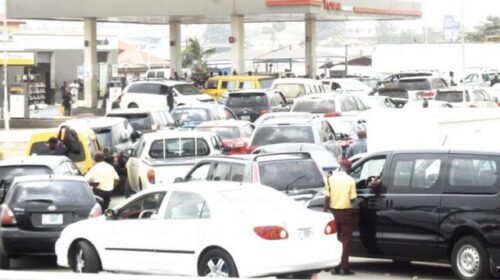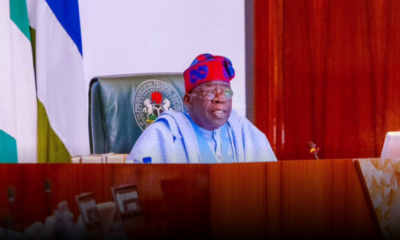The supply hitches associated with the distribution of Premium Motor Spirit, popularly called petrol, may persist till June this year, oil marketers stated on Wednesday.
Nigeria’s downstream oil sector has been grappling with cases of incessant petrol scarcity since last year.
The sole importer of the commodity – Nigerian National Petroleum Company Limited, has repeatedly complained of the enormous burden of shouldering fuel subsidy for the country.
On Monday, the Minister of State for Petroleum Resources, Chief Timipre Sylva, said NNPC was selling petrol at a loss because of its mandate from the Federal Government as regards fuel subsidy.
“If you are a businessman, look at it from this perspective, that you are now in the business where you are mandated to sell at a loss to the public. That is not an easy job, I must tell you,” the minister stated.
Last week, the Minister of Finance, Budget and National Planning, Zainab Ahmed, said the Federal Government had budgeted about N3.6tn for fuel subsidy till June 2023.
Reacting to the development, oil marketers stated on Wednesday that the fuel supply crisis in many parts of the country that often leads to fuel scarcity, might persist till June, based on the government’s plan to end petrol subsidy in that month.
The National Public Relations Officer, Independent Petroleum Marketers Association of Nigeria, Chief Ukadike Chinedu, told our correspondent that fuel imports and subsidy were making Nigerians suffer.
He said, “This issue of subsidy and the importation of petroleum products are the major reasons why we are suffering like this and having epileptic supply of PMS. This may drag till the current administration leaves in May or till June this year.
“The exchange rate is affecting fuel imports, which is also why the cost of petroleum products are high. We use too much naira to chase the few dollars that are available. So the solution is for us to refine our crude here and get our depots working.”
He added, “Also, we should note that most times when an administration is leaving, there is usually scarcity of products. It happened during the time of former President Goodluck Jonathan.
“This is because suppliers will be very weary of selling petroleum products so that their debts will not be carried over to the next administration. Successive governments have suffered this epileptic distribution of petroleum products during transition to a new government.
“The government is winding up, and if you are a supplier you have to be careful in terms of supplying petroleum products. Remember that when Jonathan was there, marketers who were supplying products stopped and went on strike, demanding that they must be paid their arrears.”
The President, Petroleum Retail Outlet Owners Association of Nigeria, Billy Gillis-Harry, also stated that the availability of petrol for marketers to distribute had remained an issue of concern.
“Let there be products to sell. That is what we are yearning for. Once that problem is sorted, then others shall be addressed too,” he stated.
Commenting on the issue, a former President, Association of National Accountants of Nigeria, Dr. Sam Nzekwe, told our correspondent that the crisis in the downstream oil sector would be best addressed when Nigeria’s refineries become functional.
IPMAN complains
The Chairman, IPMAN Satellite depot, Akin Akinrinade, said that its members were yet to take delivery of any product from the state oil firm.
He said, “We have yet to see anything. They promised us something in December, but now they said January. All they’ve done is ask us to submit names and change from the old system-NNPC Express to NNPC Retail. Other than that, we are yet to receive any product.
“But I can assure you that this scarcity will continue well after June if NNPCL does not supply us products directly and at regulated price.”
Akinrinade also said the price of fuel had hit between N222/N225 at private depots as of last Friday.
National Operations Controller, IPMAN, Mike Osatuyi, also said that his members were yet to get any product from the NNPCL.
“We are still waiting. We will wait until the middle of this month before we react. But as of last week, our members buy fuel above N200 per litre. But information reaching me is that as of today, the price has increased to N230 per litre, without transportation and other expenses”, he said.
In December, Osatuyi said that his members were holding strategic meetings with the new NNPCL Retail Managing Director, Hubb Stockman, who promised to supply them products directly at government-regulated price of N148/litre starting from this month.
However, members of the association, according to Osatuyi and Akinrinnade, were yet to receive any products despite having compiled necessary lists, and switching from the old NNPCL Express platform, to the NNPCL Retail as directed by Stockman.
However, a top member of the MOMAN who claimed anonymity said that although the scarcity had eased, some of its stations currently do not have supplies.
“The scarcity has eased and things have gone back to normal. No queues and our stations sell at normal regulated prices. However, some of our stations who don’t have supplies will be supplied”, he said, last Thursday.
The spokesperson for the Depots and Petroleum Products Marketers Association of Nigeria, Adewole Olufemi, said the depots were in need of more fuel supplies from the NNPCL.
“Until and unless the queues are completely eliminated, we’ll require more volume than usual, DAPPMAN cannot be satisfied. We’re working with the sole supplier, NNPC Ltd and the regulator to ensure PMS is available nationwide”, he said regarding the scarcity.
On skyrocketing ex-depot’s prices, Adewole said just like the NNPCL, depot owners were also on a recover-all-cost regime.
“Costs incurred by marketers, vessel chartering, trucking and approved margins will be recovered just as NNPC Ltd does to recover its cost inputs”, he added.
Credit: The Punch

 BIG STORY2 days ago
BIG STORY2 days ago
 BIG STORY4 days ago
BIG STORY4 days ago
 BIG STORY3 days ago
BIG STORY3 days ago
 BIG STORY4 days ago
BIG STORY4 days ago
 BIG STORY4 days ago
BIG STORY4 days ago
 BIG STORY2 days ago
BIG STORY2 days ago
 BIG STORY11 hours ago
BIG STORY11 hours ago
 BIG STORY1 day ago
BIG STORY1 day ago






















